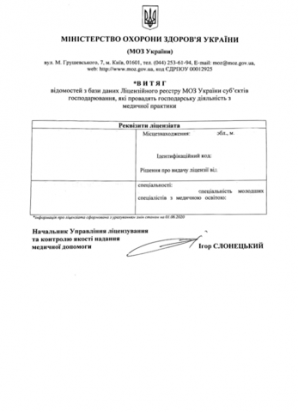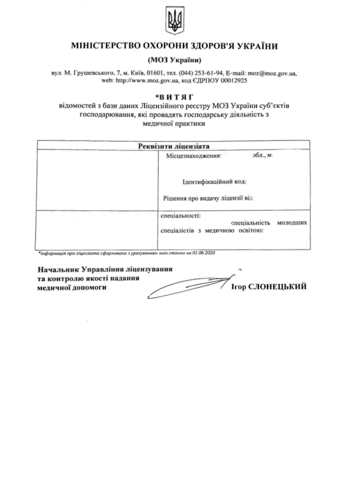Medical Documentation for Dental Clinics: Required Forms and Legal Risks
Cost of services:
Reviews of our Clients
... our work on joint projects assured us of your high level of professionalism
Do ordinary dentists fear inspections by state authorities? Absolutely. While they know their craft inside and out, they often don’t have the time to handle all the paperwork. Accounting in dentistry is usually clear-cut – you can hire an accountant and stop worrying. But when it comes to medical documentation, the situation is far more complex. Regulations, logs, journals, standard operating procedure (SOPs): which types of medical documentation are actually mandatory in dentistry?
Dentists often either maintain excessive, unnecessary documentation or, conversely, are unaware of required forms, without which the dental practice becomes legally vulnerable. That’s why our medical law specialist emphasizes the importance of proper documentation management to clients as early as the licensing stage.
In this article, we’ll examine which documents are mandatory for dental practices, what consequences may arise from errors or omissions in their preparation, and why operating without the support of a lawyer specializing in medical law significantly increases the risks for a dentist.
If, like most of our clients, you prefer not to dive into this paperwork routine and value your time, the right step is to hire a medical law expert who can develop a complete, tailored documentation package specifically for your dental business.
You might also like: Inspections of Medical Facilities: Who Conducts Them and How to Prepare
What Is Primary Medical Record Documentation in Dentistry?
Medical documentation in dentistry is not just a formality or a stack of paper forms. It is a mandatory component of a dentist’s professional and legally compliant practice. It confirms the provision of medical services, patient consent, adherence to treatment standards, and compliance with the Ministry of Health requirements. Without properly maintained medical records, a dentist loses legal protection.
The rules for maintaining medical documentation in a dental office are regulated by orders of the Ministry of Health of Ukraine (hereinafter, the Ministry of Health). The presence and accuracy of this documentation can be subject to inspection by oversight bodies such as the State Service on Food Safety and Consumer Protection, the Ministry of Health, the National Health Service of Ukraine (NHSU), and others.
Every type of medical activity must be documented, from a patient’s first visit to the completion of treatment. This applies to both individual dentists (sole proprietors) and network clinics. It is especially important to properly maintain primary dental records, particularly the dentist’s reporting documents. Together, these form the full scope of medical documentation for a dental office, which includes not only standard forms but also internal reporting and technical documentation.
Primary medical documentation in dentistry consists of standardized forms that record patient interactions, the scope of services provided, diagnostics, treatment, patient risk disclosures, and consent to procedures. The purpose of maintaining such documentation includes:
- complying with legal requirements for medical practice;
- protecting the dentist in the event of patient claims;
- enabling participation in government funding programs (e.g., through the NHSU);
- ensuring internal quality control of services.
This dental documentation must be maintained using forms approved by the Ministry of Health and preserved in accordance with legal regulations.
Which Primary Medical Record Forms Are Mandatory in a Dental Office?
To operate a dental office legally, a set of mandatory primary medical documentation forms must be maintained, as regulated by orders of the Ministry of Health of Ukraine.
According to Ministry of Health Order No. 943, a dentist is required to maintain the following medical record forms:
1. Outpatient visit card (Form No. 025-7/o) is used to record each patient’s visit to the medical facility.
2. Daily log of the dentist’s work (Form No. 037/o) documents the daily workload of a dentist in a clinic or private practice.
3. Daily logs for orthopedic dentist (Form No. 037-1/o) and orthodontist (Form No. 037-2/o) are equivalent to the general dentist’s daily log but tailored to their respective specialties.
4. Work diaries for dental practitioners (Forms No. 039-2/o, 039-3/o, 039-4/o) are maintained separately for general dentists, orthodontists, and orthopedic dentists.
5. X-ray diagnostic room log (Form No. 039-5/o) is used when radiographic examinations are conducted in the office.
6. Dental patient medical record (Form No. 043/o) is the primary document that stores all treatment-related information for a dental patient.
7. Orthodontic patient medical record (Form No. 043-1/o) is a specialized form used to document orthodontic treatment data.
8. Preventive examination log (Form No. 049/o) is maintained by dental offices serving military units or operating in a mobile format. This form is not mandatory for private practices.
9. Ambulatory surgery log (Form No. 069/o) is used to record all surgical procedures performed in the dental office.
10. Specialist consultation report (Form No. 028/o) shall be completed when a patient is referred to another specialist or receives a consultation.
11. Outpatient patient registration log (Form No. 074/o) records all instances of patient visits to the facility.
12. Dental office activity log (Form No. 290) is a general document summarizing the overall operations of the dental office.
Please note! Regardless of whether documentation is maintained in paper or electronic form, all data must be entered into the Electronic Healthcare System (EHS). This is not only a legal requirement for licensed healthcare providers but also a key to running an organized, transparent, and secure medical practice.
You might also like: Registering a Medical Facility and Individual Practitioner in the Electronic Healthcare System
Common Mistakes in Maintaining Dental Documentation
Even with approved forms and clear requirements for recordkeeping, medical professionals often make mistakes in practice that can have serious legal consequences. Below are the most common violations that dentists and clinic administrators should be aware of:
1. Use of outdated or incorrect document forms. Medical institutions often rely on forms that are no longer valid or do not comply with current regulatory standards.
2. Missing or incomplete mandatory entries. For example, records may lack signatures, diagnoses, details of services provided, or prescribed treatments. Such omissions can cast doubt on whether medical care was actually delivered.
3. Failure to enter or delayed entry of data into the EHS. All licensed entities are required to record appointments, procedures, referrals, prescriptions, etc., in the Electronic Healthcare System. Failing to do so is a serious violation of licensing conditions.
4. Failure to maintain specific documentation required for certain types of services. For example, when providing orthodontic care, it is mandatory to keep an Orthodontic Patient Medical Record (Form No. 043-1/o), and when performing surgical procedures, an Ambulatory Surgery Log (Form No. 069/o) must be maintained.
5. Keeping records only in paper format. Even when paper documentation is allowed, it's important to understand that once a facility is connected to the EHS, all core data must be duplicated or entered directly in electronic form.
6. Improper storage of documents or violation of retention periods. Each form has a specific legally mandated retention period (ranging from 1 to 10 years). Failure to comply with these timelines is also a violation that may result in penalties.
You must also like: Unscheduled Inspection of a Dental Office: How to Avoid Fines
What Are the Penalties for Violations?
Improper maintenance of medical documentation in a dental office can lead to serious consequences. One of the most common violations is non-compliance with the licensing conditions for conducting medical practice. For example:
- Failure to notify the licensing authority in a timely manner about changes to the information provided in the license application or supporting documents is punishable by a fine of 250 to 500 tax-free minimum incomes of citizens (Article 164-12 of the Code of Ukraine on Administrative Offenses).
- Improper maintenance or absence of primary medical records may be classified as a violation of medical care standards and licensing conditions.
In addition to fines, the licensing authority has the right to temporarily suspend a license until the identified violations are corrected. In cases of systemic or serious violations, the license may be revoked entirely.
As a result, lacking proper documentation or failing to update licensing information in a timely manner can effectively paralyze a dental practice and trigger inspections from the Ministry of Health, the NHSU, the State Labor Service, and other regulatory bodies. This is why properly organized dental documentation plays a critical role in ensuring uninterrupted and legally compliant operations.
You might also like: Revocation and Suspension of a Medical License
Why It’s Better to Consult a Medical Lawyer
In a dentist’s work, every signature, every entry in a form, is a potential piece of evidence during inspections, in disputes with patients, or when facing license revocation. Documents that may seem merely “technical” often become legally decisive: from a patient’s dental chart or privacy policy to a daily work log, each one can either protect the doctor or put them at risk.
The key nuance is that regulatory bodies assess not only the presence of documentation but also whether it is completed correctly in accordance with current legislation, and that legislation changes frequently.
A lawyer specializing specifically in medical law is not a “nice-to-have”; it’s a necessity. Not every accountant understands the Ministry of Health’s requirements, not every specialist knows how to properly register a patient in the Electronic Healthcare System (EHS), and certainly not every doctor has the time or duty to study legal intricacies.
Legal support is a way to stay ahead: to avoid fines, protect your license, and prevent critical mistakes in documentation. Without it, every form can turn from a confirmation into a liability.
How We Can Help
Our legal expert understands the specifics of the medical business, the requirements of the Ministry of Health, NHSU, the State Service on Food Safety and Consumer Protection, the State Labor Service, and other regulatory bodies. We can help you establish processes that prevent future violations.
We offer:
- Review and preparation of dental medical documentation. We will assess whether your primary dental records are being maintained correctly and provide guidance on how to complete them in accordance with current Ministry of Health orders.
- Legal support for dental practices and communications. We assist in obtaining a license, updating registration data, and preparing all necessary documentation for submission to the licensing authority.
- Inspection defense. We prepare you for audits by regulatory agencies, including Ministry of Health documentation reviews, accompany inspectors, and provide legal support if violations are found.
- Development of essential documentation for your dental office or clinic. We create internal policies, templates, and staff guidelines that provide legal protection for your practice.
With us, your dental practice operates with confidence, fully compliant, and without unnecessary risks or fines.
Reach out to the Pravova Dopomoga team if you want to build your medical business on a solid legal foundation.
Our clients














